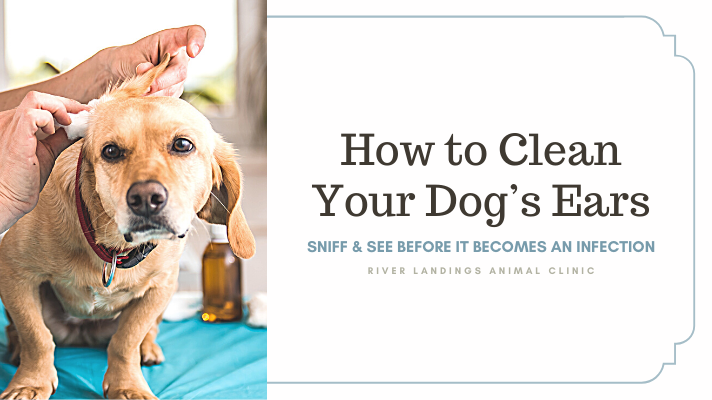Keeping your dog's ears clean and dry is an important part of keeping them healthy and happy. In this article, we explain how to do an easy-does-it ear cleaning.
Have you rubbed your dog’s ears today? Sure you have. It’s one of those things we do almost mindlessly, relishing their softness and our dog’s positive response. But did you know that rubbing your dog’s ears is also a great way to make sure they are healthy? Think about it. If your dog enjoys having them rubbed, you can tell their ears are healthy. If they’re tender from an infection or injury, your dog may pull away from you, unwilling to have them touched. Gently massaging your dog’s ears is a great first step toward checking their condition. If you notice that they are sensitive about having them touched, it’s time to take a closer sniff.
Sniff & See
Yes, sniff. Healthy ears don’t have an odor. Make a habit of sniffing your dog’s ears, starting when they are just a puppy, so you know how they smell normally. If their ears smell yeasty or downright stinky, it’s likely that a bacterial or yeast infection is brewing.
Then take a look inside their ears. The skin should be nice and pink with a light coating of pale yellowish wax. A small amount of wax is part of the ear’s self-cleaning system. If the ears look red or have a dark brown or black discharge, or if your dog frequently shakes their head, paws at their ears, or rubs them against the carpet or furniture, they need a visit to the veterinarian to see what’s causing the problem.
How do you know if your dog’s ears need to be cleaned? If they look and smell good, leave them alone. In fact, cleaning a healthy ear can damage its self-cleaning abilities or irritate it.
Clean the ears yourself (see the step-by-step directions below) if they have a mild odor and you see an occasional head shake. That may be enough to stop an infection before it takes hold. You should also clean the ears if the wax looks dirty gray instead of golden or if the ears look waxier than normal. When too much wax builds up, it can block airflow in the ear and lead to an infection of the outer ear canal.
When it comes to dogs and cats, ears are much the same. Both species get the same allergies and infections. Cats, however, are more likely to get parasitic infections (preventable with monthly or quarterly topical medications), whereas dogs are more predisposed to allergic ear disease.
Avoid Ear Infections
Take your dog to the vet if the signs—or smells—continue or worsen after you clean their ears. They may need a deep cleaning and antibiotic drops or ointment to resolve the infection.
Some dogs are ear-infection magnets. If you have a floppy-eared dog or a dog with a history of ear problems, check their ears weekly. There’s no scientific evidence that dogs with droopy ears have more ear infections, but anecdotally they tend to be the ones that veterinarians see more often with ear infections. That said, allergies are probably the main cause of ear problems, and they are seen in dogs of all types.
Your best bet for preventing ear infections is to keep your dog’s ears clean and dry. Bacteria and yeast love a warm, moist environment. Keep them at bay by drying your dog’s ears thoroughly after a swim or bath.
Step-by-Step Ear Cleaning for Dogs
Tilt your dog's head downward with one hand and squirt a gentle cleanser (ask your veterinarian for a recommendation first!) into the ear, filling the canal.
Using the flap to hold the ear closed, give it a nice massage—which will squish the cleanser around and soften any gunk inside.
Step back and let your dog shake. You may want to hold a towel between you and your pooch so you aren't in the splash zone.
Wipe away any remaining cleanser with soft, dry tissue, not going any deeper than your first knuckle. That’s all you need to do. (Don’t mess around with cotton swabs that can drive debris deeper into your dog’s ear or q-tips that can drive it down further or do damage to the inner ear.)
Hear From Us Again
Don't forget to subscribe to our email newsletter for more recipes, articles, and clinic updates delivered straight to your e-mail inbox.
Related Categories:


